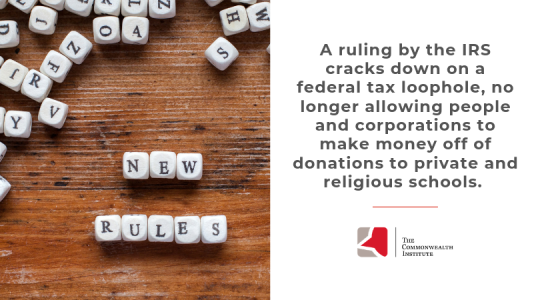July 3, 2019
New IRS Rule Narrows Tax Loophole Abused in Virginia
Earlier this month, the Internal Revenue Service (IRS) finalized a new rule helping to narrow a tax loophole that had been abused here in Virginia. The rule prevents people or corporations from “double-dipping” when making donations to private or religious schools as explained here by the Institute on Taxation and Economic Policy (ITEP). This loophole had allowed some private school donors to turn a profit from their “charity” by claiming state and federal charitable giving deductions on top of Virginia’s already generous tax credit called the Education Improvement Scholarship Tax Credit (EISTC).
Virginia is one of 18 states that has a state tax credit (sometimes referred to as a neo-voucher) as a tax incentive for people donating to private K-12 schools. As we’ve written about previously, prior to the IRS ruling, the tax benefits in Virginia actually exceeded the size of the donations for some high-income earners. Most of the state’s tax credit money goes to households with $500,000 or more in federal adjusted gross income, and over a third of the credits are claimed by those reporting more than $2 million in federal adjusted gross income. People claiming these credits are more likely to be white than Black or Latinx, due to Virginia’s long history of racial discrimination and the under-representation of Black and Latinx filers in the state’s highest income groups.
While the new ruling does not change the benefits of the state credit, it does mean people can no longer claim charitable giving deductions on top of the state tax credit. For example, if somebody gives $100,000 to a private K-12 school in Virginia and claims the state’s EISTC (valued at 65% of the contribution), then that individual will only be able to claim charitable giving for $35,000 of that donation – that is, the portion not reimbursed with a state tax credit.
The ruling is an important improvement, but does come with some limitations. First, people and businesses making stock contributions, rather than cash, may still be able to profit from their donations through avoidance of capital gains taxes. A fix suggested by ITEP is to require taxpayers to pay capital gains tax if they receive a large state tax credit as compensation for their gift of stock or property to a private school. Second, the IRS indicated additional guidance will be needed to deal with a variety of lingering issues, and it remains to be seen what that guidance will entail and when it will be released.

This is important news for tax fairness and for ending a loophole that is often abused by wealthy donors and private and religious schools here in Virginia. This past legislative session, Gov. Northam and the legislature expanded the eligibility and benefits for Virginia’s EISTC (SB1015 and SB1365), despite the “double dipping” permitted under federal law at the time. While the EISTC remains a flawed policy, this new rule is a welcome way to rein in some of its worst abuses.
Categories:
Budget & Revenue, Education
